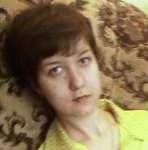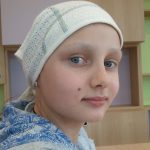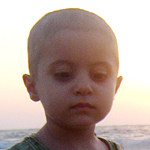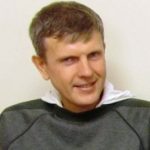 |
Natasha is a 20-year old history student from south of Russia. Two years ago a benign tumor was found in her brain after she sought help for headaches, fainting and memory loss. A tumor was removed partially, and Natasha also had radiation therapy and chemotherapy. Unfortunately, in June of 2012 the tumor began growing again. Natasha’s condition worsened rapidly and she lost feeling in the left part of her body. She needs to travel abroad, as she will not be able to undergo surgery in Russia until she has a treatment quota, which was issued for next year.
March 4, 2013: Natasha underwent surgery in Turkey and is undergoing physical therapy to help her recover function. |
|
 |
Sergii is a 21-year old from Ukraine. He has always been healthy and strong. Sergii took many prizes in regional competitions for various sports. After graduating from high school he enrolled in college. In his 2nd year of college he began experiencing strange symptoms: fatigue, night sweats, fever and enlarged lymph nodes. The doctors diagnosed him with Hodgkin’s lymphoma. Although this type of cancer is highly treatable, Sergii was one of the few unlucky patients who had a very aggressive disease that came back very quickly, even after undergoing stem cell transplant. It happened in early 2011, and in doctors’ opinion, there was nothing else they could do for him in Ukraine. After contacting Advita USA, Sergii was able to qualify for an expanded access study for a new medication for Hodgkin’s lymphoma, brentuximab vedotin (SGN35). He traveled to South Carolina and finished 16 cycles of therapy, which led to remission. However, to ensure it lasts, he needs to undergo bone marrow transplant from a donor. As bone marrow transplants are not performed in Ukraine, Sergii will have it done at National Cancer Institute in Bethesda, MD, where he is enrolled in a clinical trial. Sergii is not allowed to work while in the US and needs help with his living expenses.
10/9/12: Today Sergii underwent bone marrow transplant. He is doing well. |
|
 |
Maxim is from Kyrgyzstan. He is 3 years old. In his home country, Maxim was diagnosed with a kidney tumor. After traveling to Moscow for a second opinion, the family was told that it was too late for treatment. However, another hospital, from Israel, agreed to take them in. After an evaluation Maxim was diagnosed with a different type of cancer – neuroblastoma. He will now need to undergo extensive treatment that will include chemotherapy, surgery, radiation and a transplant of his own stem cells. The therapy will be lengthy and very expensive. | |
 |
Ksenia is from a Siberian city of Barnaul. She is 11. In January 2012 a tumor was found in her abdomen and she had a surgery. To clarify a diagnosis, she traveled to Moscow where the doctors established that she had a very rare and aggressive type of sarcoma. She then started chemotherapy, and has had a response to it. However, it is critical to remove as much of remaining tumor as possible once chemotherapy is over to reduce the risk of recurrence. Ksenia would need to travel abroad to have the best chance of survival.
8/17/12: Ksenia and her mom flew to US to begin treatment and MD Anderson hospital in Houston. |
|
 |
Kamilla is 3 years old. In summer of 2009 she received a terrifying diagnosis: retinoblastoma or cancer of her left eye. After several cycles of chemotherapy in Russia that were unsuccessful, her parents started looking for clinics abroad. In October 2009, Kamilla had two surgeries in Essen, Germany, which saved her eye and her life, as well as preserved some vision. At this time, Kamilla’s treatment is completed. However, until she is 6 years old, she needs to travel to Essen for regular checkups, as retinoblastoma is an aggressive cancer and can return at any time. Unfortunately, Russian hospitals lack equipment that could detect microscopic lesions and tools to remove them before they have grown and spread. Kamilla’s family spends 1500 euros for each examination and needs support to continue checkups.
8/24/2011: On July 5 Kamilla traveled to Germany for the examination. The tests confirmed remission. Next trip is scheduled for November 8th. |
|
 |
5-year-old Slava from Moscow got sick in October 2009. It took several months for the doctors to diagnose him with cancer, although they were unclear what exactly it was. Frustrated with slow progress, Slava’s parents brought him to a clinic in Israel on May 8, 2010. A week later, he was diagnosed with neuroblastoma, stage IV. Since then he underwent 14 cycles of chemotherapy, including 6 high-dose cycles. Unfortunately, the disease had started to progress again and there is also residual bone marrow involvement. Slava will undergo two more 14-day cycles with irinotecan and temodal, followed by examination. If there is still no response, Slava will need to travel to another country for further treatment.
5/12/2011: Based on test results, Slava has only 5% of neuroblastoma cells in his bone marrow. Two additional cycles will be administered to strengthen results. 8/1/2011: Slava’s bone marrow is free of cancer. However, he still has residual tumor along his spine. Further treatment is being discussed. 2/2/2012: Slava and his parents arrived to the US to continue therapy at Cincinnati Children’s Hospital. 4/15/2012: Slava had a surgery on spinal lesions and will undergo MIBG therapy to destroy remaining lesions. |
|
 |
Khamid is 15-year-old boy from Tajikistan. In June 2010, Khamid and his mom arrived to New York City. Shortly after, Khamid developed high fever and was rushed to a hospital where he was diagnosed with the acute lymphoblastic leukemia. While currently in remission, Khamid’s treatment should continue for at least one more year, on an outpatient basis. In the meantime, Khamid’s mother Nargis gave birth to a girl and they all are in a dire need of clothes, food, and place to live.
11/9/2011: Khamid is doing well and is now studying in 9th grade in International High School. Due to long-term steroid therapy, he developed vascular necrosis in his hip joint and started limping, but doctors believe it should get better after steroids are canceled. 1/23/12: Khamid is in remission. He goes to 10th grade as Manhattan International High School. Khamid feels well and has many friends. He continues to visit and support his friends at Ronald McDonald House in NYC. Khamid still has issues with his hip joint, and may need further treatment in the future. |
|
 |
Susanna is 24 and she lives in Tajikistan. When Susanna was just 18 months old, she was diagnosed with neuroblastoma, a type of childhood cancer. She was successfully treated and remained in remission for 18 years – until cancer returned in 2009… Treatment in Tajikistan and Russia was not effective, and Susanna now needs to travel abroad for better diagnostics and treatment. It is most unusual for neuroblastoma to occur in adults, and many pediatric oncology programs cannot accept Susanna as a patient. After extensive search, she was invited to travel for treatment in Germany. However, the treatment cost is unaffordable for her family.
5/14/2011: Susanna and her mom traveled to Moscow for evaluation after Grant Life charity paid for their air tickets. Afterwards, Susanna plans to see a specialist in St. Petersburg to discuss further treatment. 7/8/2011: Susanna underwent imaging studies, blood tests and a tumor biopsy. A surgery is preliminarily scheduled for September. 11/11/2011: Susanna’s bone fragment was sent for genetic test in Austria. Thanks to Dr. Ambros, test was done for free. |
|
 |
Elen is 4-year-old from Yerevan, Armenia. In March 2010, Elen got fever and started moaning when breathing. The parents went to the pediatrician who detected tumor in the right side of Elen’s abdomen. After subsequent CT scan, the doctors consented on neuroblastoma in the right retroperitoneal space with metastases in lymph nodes and liver. Elen was sent to the National Center of Oncology in Yerevan where after the biopsy she was diagnosed with the primitive neuroectodermal tumor (PNET). Elen completed a cycle of chemotherapy but was unable to complete the other two due to a weak immune system. The parents were advised to continue treatment abroad. Elen was taken to the Haim Sheba Medical Center in Israel where an examination revealed that PNET diagnosis was incorrect and she, in fact, had neuroblastoma. At this point, Elen is recommended to undergo intensive chemotherapy and surgery, followed by the autologous bone marrow transplantation.
9/29/2010: Elen finished the first cycle, but had serious complications and spent ten days at the hospital, for which her family was billed additional $15,000. 12/29/2010: Based on last test results, Elen had good response to new protocol: the tumor shrank in half, and all the metastases had gotten smaller. Tumor activity had also gone down. Elen underwent a very important procedure: collection of her bone marrow. It will be needed for autologous transplant once chemotherapy stage of treatment in completed. 4/6/2011: Elen completed two more cycles of chemotherapy under a different protocol. After the third cycle, she will have a thorough examination. 6/13/2011: Unfortunately, Elen had a progression of her disease. Her treatment protocol was modified. 10/25/2011: Elen and her parents transferred to Greifswald, Germany for further treatment. Elen had completed diagnostics and two cycles of chemotherapy. After two more cycles she will be re-evaluated. 5/1/2012: Elen had surgery to remove the primary tumor and a part of her liver. She is preparing for MIBG therapy. It will be followed by autologous bone marrow transplantation. |
|
 |
Sergei is from Moscow region. He was diagnosed with Hodgkin’s lymphoma in 1997. Since then he had three relapses of the disease. After the latest relapse, in February 2011, he was told that his doctors has nothing to offer him anymore. We helped Sergei get enrolled in an expanded access study for Hodgkin’s lymphoma patients in the US. The study was allowing patients with relapsed disease access a new drug that has shown impressive results in the earlier clinical trials. In June 2011 Sergei arrived to Greenville, SC to participate in the study. Thanks to the sponsor of the study, Sergei will be able to continue receiving medication even after it is approved for commercial use. However, since he will be staying in the US for several months, he needs support with lodging and living expenses.
7/14/11: A video about Sergei and another patient who arrived from Ukraine to participate in the same study was shown on the local TV. 8/24/11: Great news: Sergei underwent CT scan that did not show any abnormalities in his chest! At his next infusion in September he will discuss it with his doctor. 4/12/12: After completing 12 cycles of therapy, Sergei will be returning home at the end of April. He is in complete remission. |
|
 |
Miroslava is from Kharkiv, a city in Ukraine. Until she was 1, she seemed to develop like other babies: she sat down and got her first teeth right on schedule. She was only delayed with walking. Months were going by, but Miroslava never tried to get up and walk. Massage did not help either. Eventually, Miroslava’s pediatrician referred her for MRI scan – and the results were shocking. Mira had numerous brain lesions and hydrocephaly. To add to the stress, doctors’ opinions varied. The one thing they agreed on was that the tumor was inoperable. Then Miroslava parents heard of Helios Clinic in Germany where other Ukrainian kids with brain tumors were treated successfully. They followed their lead and brought Miroslava for a consultation to Berlin in January 2010. At the clinic, Miroslava was diagnosed with medulloblastoma. The treatment was started immediately and Miroslava is gradually improving. She already finished four cycles of chemotherapy and is now completing radiation therapy. Still, Miroslava needs to undergo six more cycles of chemotherapy, which will cost close to 30,000 euros.
10/8/2010: Miroslava completed one of the six cycles of maintenance therapy planned. Her blood counts plummeted and she was hospitalized for blood transfusions. She is planned to undergo control MRI once her blood counts rise. Miroslava still needs a lot of support! 11/9/2010: Miroslava is undergoing the second cycle. After her blood counts plummeted, she caught an infection and spent 5 days at the hospital on antibiotics therapy. She is now stable. Mira is growing and developing. She learned to speak many words and enjoys going to classes at the clinic. However, she is not walking yet. Mira will start physical therapy very soon to help her with walking. She will undergo control MRI tests on November 17th. 8/28/2011: Miroslava is still being treated in Germany. Although she is stable, she has residual tumors. It is not clear whether they have active cancer cells or not. Next week she will go for MRI and her further treatment will be discussed. |
|
 |
Katya is 4, and already spent half of her life in the hospitals. Katya has a stage IV neuroblastoma. Since she could not get treatment in Ukraine, Katya and her mom traveled to Singapore, where Katya received a bone marrow transplant and achieved remission. However, neuroblastoma is a difficult type of cancer to treat, and up to 50% of patients relapse. Katya’s treating doctor recommended anti-relapse therapy with monoclonal antibodies.
December 10, 2009: “Hello! I would like to share our good news. In November, Katya underwent the first full examination after the treatment for neuroblastoma and autologous BMT. We went to Singapore, to Katya’s treating doctor, for tests. He tested Katya and was happy to tell us results: the tests showed that she was in complete remission! The next full examination is planned for the end of February – beginning of March. We are still hoping that Katya will be able to receive anti-relapse therapy, since she is at high risk for recurrence. We are trying hard to find the money and not waste precious time! We are very thankful to everyone who supports us and donates money for Katyusha!” – Alina, Katya’s mom March 12, 2010: Katya was examined in Singapore. She is confirmed to be in remission! We are continuing raising funds for anti-relapse therapy. The children with stage IV neuroblastoma (Katya’s diagnosis) who undergo this procedure double their survival chances. March 27, 2010: “Hello! I’d like to share our latest news about Katya’s health. In the beginning of March Katya went for a checkup in a clinic in Singapore. The day after our arrival, she had whole-body PET imaging. The results were good. After comparing images to the previous ones, her doctor concluded that there are no changes, and Katya’s body is cancer-free! The blood tests are also good. The doctor did not offer bone marrow biopsy because he felt extra procedures are unnecessary if there are no indicators of a relapse. So Katya’s remission is confirmed and we can now breathe easier. February 2, 2011: Hello! We have good news. We raised the amount necessary for the first payment to the Greifswald clinic in Germany! EIN HERZ FUR KINDER fund donated 20,000 euros for Katyusha’s treatment. We now have money for the first stage of treatment. May 12, 2011: Katya is continuing therapy with ch14.18 antibodies – she is now in third cycle. In about two weeks she will undergo complete evaluation of response to therapy. A tumor biopsy showed that it has a mixture of malignant and benign cells and it is n-myc negative. Based on results of evaluation, further therapy will be discussed. |
|
 |
Anna was diagnosed with a malignant teratoma, an extremely rare type of cancerous tumor. Even though it grows very fast and metastasizes, it is considered curative, with proper and timely treatment. Since her diagnosis, Anna has endured more than most people will in a lifetime: countless hospitalizations, 10 rounds of aggressive chemotherapy, surgery to remove the tumor along with her tailbone, and numerous invasive tests. Now the cancer is back, but Russian doctors can’t pinpoint its location. The need is urgent. The cancer MUST be located immediately for the correct treatment to begin, or it might be too late. Doctors are encouraging the parents to seek more accurate diagnostics and treatment abroad. To learn more about Anna’s story, please visit her web site at www.vaprov.ru. March 23, 2011: Anna and her parents found a hospital in Dusseldorf, Germany, where Anna is offered hyperthermic chemotherapy and possibly surgery. Today they flew out of Moscow and Anna will start treatment shortly. March 25, 2011: Anna started first cycle today. Altogether, four cycles are planned. May 31, 2011: Anna will have a surgery tomorrow. Based on results of tests, further treatment will be decided upon. August 31, 2011: Anna will have to have an MRI for her doctors to look at the result of just-finished radiation treatments. They said that the MRI will need to be done in 6 weeks from now. In the meantime, she’ll be going in for weekly port flushing, as well as AFP blood tests. |
|
 |
Irina was growing up just like other kids until the age of 10. At 11, a simple surgery triggered a serious neuromuscular disease, myasthenia gravis. This autoimmune disorder causes progressive muscular fatigue. Within two years, Irina became unable to walk, and a year later, stopped breathing. Next, her heart stopped beating.
The two following years were an unending nightmare: long stays in intensive care, coma, artificial lung ventilation. Although Irina survived, she had to stay in a wheelchair for the rest of her life. Irina however refused to give up on herself: she fought for her right to lead a normal life. She became a volunteer and later a Board member of a charity. And then her life was put on hold by her disease once again: Irina’s joints started to degenerate. She underwent seven operations on one of her knee joints – without success. Her last hope was a visit to the University Clinic in Regensburg, Germany. It was quite a shock to discover that she needed a series of surgeries to replace her damaged joints. In July 2008, Irina had the first surgery on joints, and in April 2009 – the second. The bone degeneration was caused by a genetic mutation that led to excessive blood clotting interfering with supply of blood to organs and tissues, and their eventual demise. In September 2009, there was another unpleasant discovery – a rare form of arrhythmia due to a genetic heart defect. It meant Irina’s heart could stop at any moment. Just ten years ago, Irina would be out of luck. Now, she has a risky but viable option: experimental open heart surgery to implant a defibrillator to help her heart re-start working if it stops. The cost of the operation is 18,000 euros. November 25, 2009: Irina underwent a successful surgery, and she is now recovering. January 6, 2010: Irina has a serious post-operative complication, a pleurisy. We urgently need to raise 5,000 euros. February 22, 2010: Irina is already at home. Unfortunately, she is still fighting post-operative complications. Irina is continuing therapy with antibiotics and other medications. Her pacemaker is working well. May 27, 2010: Irina came to a clinic in Halle, Germany. The examination of her pacemaker revealed that one of the electrodes was infected. This caused the post-surgery complications. The electrode will have to be removed, cleared of infection and installed back. June 5, 2010: Unfortunately, Irina developed a pulmonary hemorrhage. The procedure on replacement of infected electrode and antibiotic treatment will require at least 15,000 Euro. July 14, 2010: Irina was operated and the infected electrode was removed without damage to the lung. Irina spent 6 days in intensive care but now she feels better. September 7, 2010: Irina had another surgery to install a new electrode to the pacemaker. It went well. December 9, 2010: Based on test results, Irina has an opening in the heart that did not heal after surgery. She needs new operation to fix this defect. January 7, 2011: Irina needs an occluder to be installed to close aneurisma. If done on a beating heart, it would require additional 1,615 euros to be raised. However, if her heart will need to be stopped during surgery, she would need additional 10,000 euros. January 31, 2011: Irina underwent surgery in Germany. The surgery required her heart to be stopped for 102 minutes and was successful. Irina is now recovering. |
|
 |
Nadya is 4 years old. In 2008, when she was just 8 months, she was diagnosed with juvenile pilocytic astrocytoma (tumor of optic nerve). Nadya spent 1.5 years in the hospital in St. Petersburg going through rounds of chemotherapy. Once it was stopped, the tumor growth resumed. Nadya needed emergency surgery to survive. The operation lasted 7 hours. More than a half of the tumor was removed. But the tumor infiltrated the optic nerves and the chiasm so that both eyes were affected. After surgery, Nadya lost her sight. Now she needs to continue treatment to remove the tumor as it has been growing again and causing fatigue and pain in her eyes. After reviewing Nadezhda’s medical records, the surgeons in Johns Hopkins Hospital agreed to perform the surgery. Nadya’s family has to raise over $90,000 to cover the cost of surgery, chemotherapy or radiation following the tumor debulking. To learn more about Nadya, please visit her site www.zlata.1gb.ru/eng. March 31, 2011: Nadya’s parents raised funds necessary for surgery and chemotherapy! Nadya and her mom and dad arrived to Baltimore today. May 29, 2011: Nadya had chemotherapy for a month, and CT scan showed that her tumor has not decreased, but has not grown either. It was decided to continue with chemotherapy and re-evaluate Nadya in late summer. June 23, 2011: Nadya’s shunt got blocked and she developed hydrocephaly. She underwent urgent surgery to replace the shunt and drain the fluid. She is now recovering at the hospital and chemotherapy will be postponed by 2 weeks. September 7, 2011: Nadya underwent MRI that showed the tumor is stable, and it also started developing necrotic lesions. In other words, medication that Nadya takes is working and tumor is responding to it and slowly dying. For now, the percentage of necrotic cells is small but the most important thing is that Nadya is responding. The study results were discussed at a group meeting and the doctors agreed that therapy should be continued. |
|
 |
Natasha was 10 when she first got sick with acute promyelocytic leukemia. Her treatment was not completed, and a year later her father died. In one more year, her mother lost her parental rights, and Natasha ended up in an orphanage. In 2007, Natasha had a relapse of her disease. Fortunately, while at the hospital Natasha met her future adoptive mother who took care of her and together they won over Natasha’s disease. However, recent tests discovered a genetic mutation which will inevitably lead to a relapse, so Natasha needs to start treatment urgently. The medication that can save Natasha is called Trisenox and is not registered in Russia. She needs to travel to Germany where such treatment is possible, but will cost 113,000 euros.
April 1, 2011: Natasha was examined in Munich and test results did not confirm relapse. Natasha will continue monthly blood tests. |
|
 |
Olga is 24 years old. Since she was 19 and a second year student at a college, she has been fighting Hodgkin’s lymphoma. Unfortunately, it has been recurring ever since, despite numerous chemotherapy protocols and bone marrow transplantation of Olga’s own stem cells, which she had in July of 2009. In October 2009, it was determined that transplantation was not effective and the tumor continued growing.
March 19, 2010: Olga received an invitation for a clinical trial from Italy. April 13, 2010: Olga’s flight to Napoli went well. She was met at the airport. On Monday she was hospitalized. She had a blood test and was installed a catheter. Today Olga had PET imaging, and another study is scheduled for Friday. April 27, 2010: Olga received therapeutic injections. If all goes well, Olga will be able to fly home on May 2. She will then return to Italy for follow-up tests in 40 days. May 28, 2010: Olga returned home in early May. She now goes for weekly blood tests to monitor for possible toxicity. Yesterday she had the first CT scan since the therapeutic injection, and the results are very good! Only two enlarged lymph nodes still remain. June 10, 2010: Based on control scans, Olga is in remission! She was the first patient on the trial with such a good result. September 21, 2010: Unfortunately, Olya’s disease is progressing again. She needs to return to Italy for a second injection in October. Please help Olya with paying for her travel expenses (roundtrip to Italy costs close to $1,000). October 8, 2010: Olya will return to the clinic in early November after undergoing bone marrow tests at home. Dec 12, 2010: Olga underwent a second injection of radioimmunotherapy drug in Italy. She feels well and hopes for a good result. |
|
 |
Elena is a young woman from Belarus. In June 2008, she was diagnosed with stage III stomach cancer. After having her stomach removed and undergoing 6 cycles of chemotherapy, Elena was cancer free. Unfortunately, in just a few months, she was diagnosed with a relapse. She had more surgery and thermal chemotherapy in Minsk. However, this time her doctors only considered therapy as palliative, giving her no hope for living longer than a year. Elena has two children: a 16-year old daughter and a 6-year old son. She could not get resigned to the idea of not being around to see them grow. Elena started to look for treatment options in other countries. With help of US-based Harmony Life fund, Elena was able to go for treatment in Israel. In total, she is planned to undergo six cycles of chemotherapy with Erbitux. The cost of treatment will be $35,000. At this time, Elena only has enough money for one cycle of chemotherapy. July 18, 2010: After the first cycles of chemotherapy, Elena’s oncomarkers (tumor markers) are 3 times lower – which means Erbitux works! Her next visit to the hospital is scheduled for the end of July. Sept 20, 2010: Elena reported that Erbitux was approved in Belarus, and it is now available to her for free in her home country. She no longer needs to travel to Israel for treatment! |
|
 |
Marina was a model and an active organizer of community events, such as motocross competitions. Then she had a terrible disease – synovial sarcoma – that almost killed her. After three years of fighting for her life, Marina won – but at the cost of losing her arm, and most of the shoulder. Because of this disfigurement, she is unable to wear regular clothes, as they cannot stay on just one shoulder. During years of treatment, Marina’s and her relatives’ savings were spent and they incurred debts. She now needs a prosthetic arm to attempt a return to normal life. However, it has proven very difficult to find a company that could make a prosthetic limb for such a radical amputation. The only company that was able to help was Touch Bionics from Scotland. They offered Marina three options, ranging from a cosmetic arm with limited function to almost human-like bionic arm. The costs of the prosthetic options vary from $34,000 to $101,000.
April 14, 2010: Argumenty i Fakty newspaper has published article about Marina. April 27, 2010: Marina will need to arrive to Scotland by May 2 for initial consultation and measurements. Once her prosthesis is ready, she will travel to Scotland again to have it installed. May 11, 2010: Marina returned from her first trip to Scotland where she had visited the clinic in Livingston, near Edinburgh. The clinic personnel spent several days matching the color of her skin to her right arm. Marina saw samples of the prosthesis and was very impressed by the quality. Once hers is ready, she will be able to bend the fingers. Marina has no doubt she will be able to wear short sleeves! In about two and a half months, Marina will return to Edinburgh to pick up the custom made prosthesis. |
|
 |
Inna is 9 years old. When she was 4, she stopped breathing in her sleep. Miraculously, her parents managed to save her. She then spent four months in intensive care unit on artificial lung ventilation.Inna was diagnosed with apnea (Ondine curse). Eventually, she became stable and was able to breathe by herself.However, in three years, Inna suffered from the same health problem.The doctors were unable to help her, and she needed to be on artificial lung ventilation twice a week.As a complication, Inna often suffered from bronchitis. Fortunately, her parents found out that Inna could benefit from an operation to implant a pacemaker. The surgery could be performed in Russia, but the pacemaker was manufactured in USA and cost $66,000. We contacted the manufacturer (Avery Biomedical Devices) and it graciously donated part of the equipment to Inna. By September 1, 2009 Inna’s parents and their supporters were able to raise the rest of the amount. June 18, 2010: Today Inna had surgery to implant the breathing pacemaker. It took many months to have the device certified in Russia. Inna’s parents along with parents of other children who needed the pacemakers worked hard to get equipment certified as quickly as possible. September 22, 2010: After years in the hospital, where Inna was constantly hooked to a ventilator and was continually suffering pneumonias, she was finally able to go home. |
|
 |
Olya is 10. In June 2009 she started feeling unwell and was having frequent nosebleeds. Eventually, she was diagnosed with acute lymphoblastic leukemia. At the hospital, Olya developed serious complications: kidney failure and diabetes.
In November 2009, Olya’s doctors recommended her to undergo bone marrow transplantation. An unrelated donor needs to be located at the international bone marrow donor registry, and the search costs 15,000 euros. Olya is being brought up by her grandmother who had to leave her job to care for Olya at the hospital. They need financial support to pay for the donor search and for Olya’s treatment. August 23, 2009: Olya had serious complications due to stones in her kidneys. She is now undergoing another course of high-dosage chemotherapy. The girl was recommended unrelated bone marrow transplantation. In the next few days, she will be typed, and the results will allow determining whether Olya has matching donors at the international registry. January 12, 2010: Olya feels well. She is starting a planned course of maintenance therapy. The main course of treatment is completed, and Olya achieved remission. She still needs therapy with Noxafil. February 28, 2010: During the last month, Olya had pains due to stones in her ureters. She had surgery to install shunts in ureters and she now feels better. Olya was able to start another cycle of maintenance therapy. She still has fungal infection in her lungs, and CT scan even showed some worsening. April 15, 2010: Olya is recovering after another chemotherapy course. She had serious complications, renal bleeding, which the doctors managed to overcome. Fortunately, the last lung tomography and blood counts allowed the doctors to cancel antifungal drugs, and Olya does not need Noxafil any longer. July 6, 2010: Olya is at home but every Tuesday she comes to the outpatient unit for tests. If the results are good, she goes back home. Olya and her grandmother are very happy that they don’t need to stay in the hospital all the time. |
|
 |
Alexei is 17 years old. He was in his last year at high school when he got sick with myelodisplastic syndrome (refractory anemia with excess blasts RAEB-1). In February 2009, Alexei came to St. Petersburg from Omsk, his native Siberian city, and the test results showed that his illness is progressing and transforming into acute leukemia. Alexei needed bone marrow transplantation, and, fortunately, a donor for him was found in Germany. His relatives raised 5,000 Euros, but the rest of the money (10,000 Euros for the collection of transplant and 2,500 Euros for the delivery) has to be collected as soon as possible, because Alexei’s remission is unstable.
July 10, 2009: Alesha underwent bone marrow transplantation. However, he still owes donor registry 10,000 euros. September 10, 2009: Alesha successfully recovered after transplantation and the doctors allowed him to go home to Omsk for a month. October 15, 2009: Alesha and his mom came to St. Petersburg for control tests. |
|
